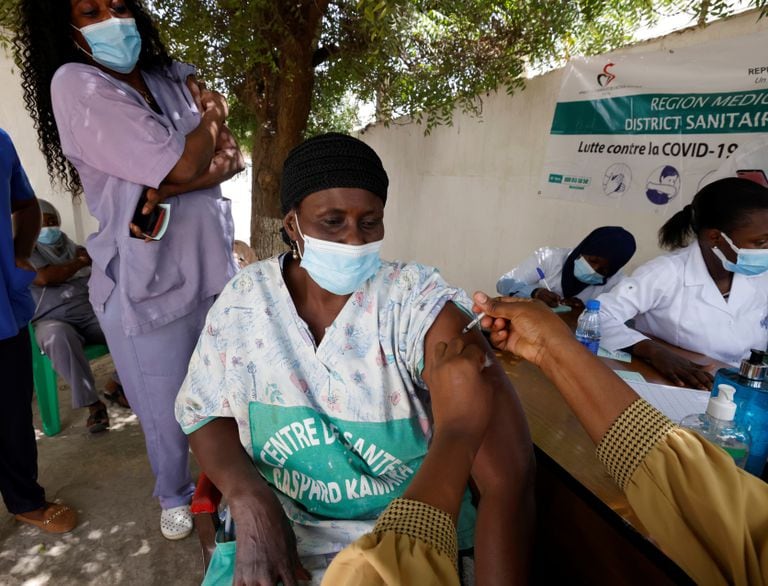A health care provider receives a dose of the vaccine against covid-19 in Dakar (Senegal) .ZOHRA BENSEMRA / Reuters
The latest wave of globalization generally brought with it an increase in inequality within countries and an acceleration in the convergence between developing and advanced economies.
The coronavirus crisis, however, is on the way to ruin this second part of the story: while per capita income will suffer a reduction of 22% in emerging countries (without China) until 2022 and 18% in the most important countries. poor, the decline will remain at 13% in the rich block.
Everyone will lose out, but those who most need growth to reduce their social gaps will also be the worst offenders from covid-19, according to data published this Wednesday by the International Monetary Fund (IMF).
A trend that will exacerbate the, to date, slow deployment of vaccines in nations with fewer resources.
Emerging: the blind spot of the crisis
The different speeds of the vaccine: 3.4 doses per person in rich countries and only average in poor ones
The price the rich will pay for not vaccinating the poor
Poor countries will receive the first 1.2 million vaccines from Pfizer and BioNTech by the end of February
"The world economy is at a crossroads, and the question is whether measures will be taken to avoid this Great Divergence", emphasizes the managing director of the Fund, Kristalina Georgieva, in a statement with a clear target: finance ministers and central bankers of the G20 (the forum that brings together the major economic powers on the planet), which will meet telematically on Friday to review the crisis.
"There is a significant risk that advanced economies and a few emerging economies will recover faster while most developing countries languish in the coming years, (...) especially those most exposed to the worst hit sectors such as tourism. or oil ”.
Before the pathogen turned the world upside down, the IMF predicted that the income gap - albeit narrowing - between rich countries and 110 of their developing peers would continue to close between 2020 and 2022. But things have changed a lot since So: less than a year later, he believes that only 52 middle- and low-income nations are able to close the distance that separates them from the rich world;
the rest "will be left behind."
Vaccines and fiscal support, keys
“In part, this has to do with unequal access to vaccination.
In the best of cases, the bulk of developing economies will reach generalized coverage by the end of 2022, ”remarks the head of the Washington-based body, which in the last decade has gone from orthodoxy to defending more positions. social and now makes a clear call for rich countries to support the poor in containing the virus.
“The arguments for coordinated action [on vaccination] are overwhelming: rapid progress in ending the health crisis would increase global output by nine trillion dollars [7.4 trillion euros, more than six times Spain's GDP and more than seven times that of Mexico] between 2020 and 2025 ″, adds Georgieva.
In that scenario, the revenue for advanced economies would be about four trillion dollars.
"A figure that far exceeds the cost of vaccination," he emphasizes.
Although it is an essential factor, not everything has to do with the drug's deployment schedule.
Last year, rich countries - which generally have more fiscal space, stronger and more credible central banks, and currencies much more resistant to fluctuations in financial markets - deployed a battery of fiscal stimuli equivalent to 24% of its GDP, four times more than emerging countries (6%) and twelve times more than low-income ones (2%).
"And cross-nation comparisons show how higher [public] support is associated with lower job losses."
"The alternative, leaving poor countries behind, would not only consolidate inequality: worse still, it would pose a great threat to world economic and social stability and would be a lost historic opportunity," warns the head of the Fund.
"We can draw inspiration from the spectacular international cooperation that has provided us with effective vaccines in record time - that spirit is now more important than ever to overcome this crisis and ensure a strong and inclusive recovery."
IMF asks the G20 for more measures to alleviate the developing bloc's debt
With all the alarms sounding in the developing world, in April of last year the G20 presented a relief plan that went through a moratorium on the repayment of loans assumed by the poorest countries.
In November, the club of the twenty major global powers extended its duration by six months, but the Monetary Fund knows little.
"It has freed up vital resources, but it can go even further," modifying the profile of debt service to help countries facing large financing needs and deeper relief where the burden has become unsustainable. "

